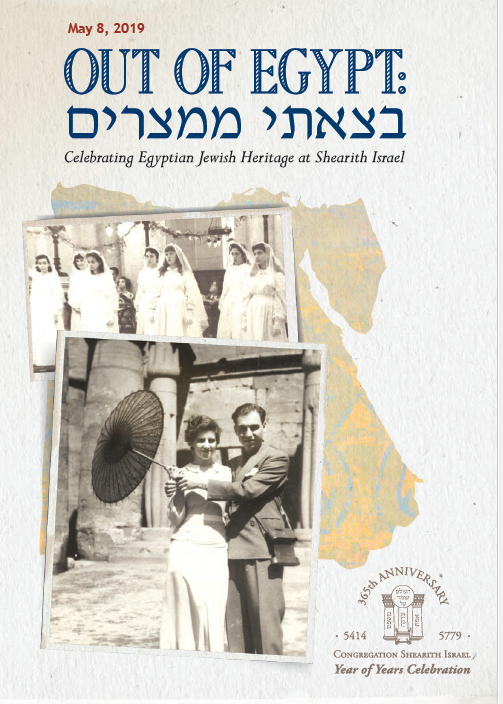GOING OUT OF EGYPT:
A PERSONAL STORY1
By Rabbi Albert Gabbai2

Thanks to Congregation Shearith Israel.
To tell my personal story in Egypt is really to tell the story of many of my coreligionists. I was blessed of being born a Jew to parents who came from different backgrounds as were many Jews who came to Egypt since the beginning of the nineteenth century. I am one of ten siblings. It was wonderful to be part of such a large family. Our father was born in Baghdad to a family of rabbis and learned sages. The name Gabbai goes back to Talmudic times. In the Talmud tractate of Sanhedrin it is written “Kol Gabbai Kasher,” “every Gabbai is honest.” As a child, my father came to Egypt with his family, like many others, to find fortune there. He traded in silk shirts. Our mother came from a family originally from Livorno, Italy. They met in Egypt. Like many of the Jews in Egypt our culture was French along with Italian, and English, and Greek. My mother’s mother, my maternal grandmother, was born in Salonika, Greece. Her family spoke Spaniolit (Ladino) and many of her sisters married in the Ashkenazi community.
We were sent to French school, the Lycée Laïque (secular) Français or the Collège de la Salle (French Catholic School). Just imagine: an observant Jew in a French Catholic school, in a Muslim country! The majority of the students were Jews but we made friends very naturally and easily with all, Jews, Christians, and Muslims alike. We had a wonderful, easy life with a lot of privileges.
When Nasser’s Pan-Arab nationalism swept the whole Middle East, life became very difficult for the Jews. Like many others, we started leaving Egypt. First, four of our brothers planned to leave for the United States where they became U.S. citizens. Although the Egyptian government was very happy to expel us and kick us out, they made our life miserable by giving us a difficult time getting out.
We were supposed to leave during the summer when I was in high school in June 1967. We were just waiting to be granted an exit visa, which were so coveted and so difficult to obtain. When the Six-Day War broke out, my three brothers and I were rounded up by the secret service and put in a prison camp.3 The authorities would not tell our mother of our whereabouts.
Three years of imprisonment passed, until under pressure from the outside, we were allowed to leave. We were taken from the prison camp directly to the airport, settled inside a plane, and flown to Paris. Imagine our situation, from extreme confinement to extreme freedom!
It was about a year later on a snowy January night, when I arrived in New York. I still remember the melody played at the Kennedy Airport: “If I were a rich man …” It was a dream come true to finally arrive in America and be reunited with my family. When I became a student at Yeshiva University, I went to the library to look at the microfilms of the New York Times to see what was going on while I was in that horrible hole for three years. I was not a bit surprised to discover that there were constant demonstrations at the Egyptian delegation at the United Nations in New York demanding the release of the Jews in prison camps in Egypt. I was not surprised by these demonstrations by our fellow Jews because, as the Talmud says, “the Jewish people is like the human body, if a limb hurts, the whole body hurts.” No doubt that we can say that this effort contributed to our freedom.
Blessed be the people of Israel, Am Israel Hai.
1 This memoir was part of a gathering of Egyptian Jews at Shearith Israel, on May 8, 2019. The collected memoirs were published in a booklet, Out of Egypt: Celebrating Egyptian Jewish Heritage at Shearith Israel. The guest speaker was Andre Aciman. The editors thank Rabbi Gabbai and Shearith Israel Congregation for permission to reproduce this piece.
2 Rabbi Gabbai was the Assistant Hazzan at Shearith Israel from 1983-1986. He has been the Hazzan and Rabbi of KK Mikveh Israel in Philadelphia since 1988.
3 Thank God they did not touch the women at this time.
Copyright by Sephardic Horizons, all rights reserved. ISSN Number 2158-1800
